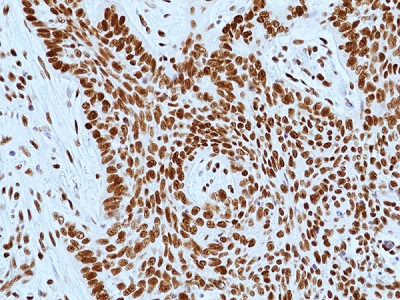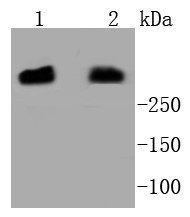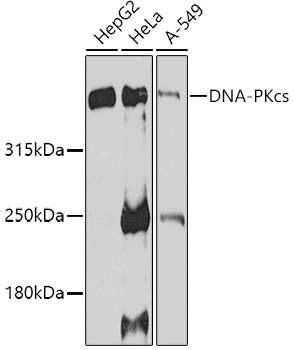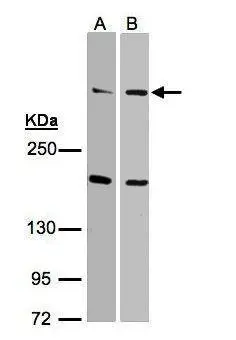
Immunohistochemical staining of formalin-fixed and paraffin-embedded human lung cancer without radiotherapy tissue sections using anti-DNA-PKcs Rabbit Monoclonal Antibody (RM505) at 1:100 dilution.
anti-DNA-PKcs (human), Rabbit Monoclonal (RM505)
REV-31-1397-00
ApplicationsWestern Blot, ImmunoHistoChemistry
Product group Antibodies
ReactivityHuman
TargetPRKDC
Overview
- SupplierRevMAb Biosciences
- Product Nameanti-DNA-PKcs (human), Rabbit Monoclonal (RM505)
- Delivery Days Customer10
- ApplicationsWestern Blot, ImmunoHistoChemistry
- CertificationResearch Use Only
- ClonalityMonoclonal
- Clone IDRM505
- Gene ID5591
- Target namePRKDC
- Target descriptionprotein kinase, DNA-activated, catalytic subunit
- Target synonymsDNA-PKC, DNA-PKcs, DNAPK, DNAPKc, DNPK1, HYRC, HYRC1, IMD26, S473K, XRCC7, p350, DNA-dependent protein kinase catalytic subunit, DNA-PK catalytic subunit, hyper-radiosensitivity of murine scid mutation, complementing 1, p460, protein kinase, DNA-activated, catalytic polypeptide, ser-473 kinase
- HostRabbit
- IsotypeIgG
- Protein IDP78527
- Protein NameDNA-dependent protein kinase catalytic subunit
- Scientific DescriptionDNA-dependent protein kinase (DNA-PK) is an important factor in the repair of double-stranded breaks in DNA. Cells lacking DNA-PK or in which DNA-PK is inhibited fail to show proper nonhomologous end-joining (NHEJ). DNA-PK is composed of two DNA-binding subunits (Ku70 and Ku86) and one 450 kDa catalytic subunit (DNA-PKcs). It is thought that a heterodimer of Ku70 and Ku86 binds to double-stranded DNA broken ends before DNA-PKcs binds and is activated. Activated DNA-PKcs is a serine/threonine kinase that has been shown to phosphorylate a number of proteins in vitro, including p53, transcription factors, RNA polymerase, and Ku70/Ku86. DNA-PKcs autophosphorylation at multiple sites, including Thr2609 and Ser2056, results in an inactivation of DNA-PK kinase activity and NHEJ ability and may play a role in disassembly of the DNA repair machinery. Autophosphorylation at Thr2609 has also been shown to be required for DNA-PK-mediated double-strand break repair, and phosphorylated DNA-PK co-localizes with H2A.X and 53BP1 at sites of DNA damage. Phosphorylation at Ser2056 occurs in response to double-stranded DNA breaks and ATM activation. Higher expression of DNA-PK has been determined in several cancer tissues making it an interesting biomarker. - Recombinant Antibody. This antibody reacts to human DNA-PKcs. Isotype: Rabbit IgG. Immunogen: A peptide corresponding to the C-terminus of human DNA-PKcs. Application: IHC, WB. Liquid. 50% Glycerol/PBS with 1% BSA and 0.09% sodium azide. DNA-dependent protein kinase (DNA-PK) is an important factor in the repair of double-stranded breaks in DNA. Cells lacking DNA-PK or in which DNA-PK is inhibited fail to show proper nonhomologous end-joining (NHEJ). DNA-PK is composed of two DNA-binding subunits (Ku70 and Ku86) and one 450 kDa catalytic subunit (DNA-PKcs). It is thought that a heterodimer of Ku70 and Ku86 binds to double-stranded DNA broken ends before DNA-PKcs binds and is activated. Activated DNA-PKcs is a serine/threonine kinase that has been shown to phosphorylate a number of proteins in vitro, including p53, transcription factors, RNA polymerase, and Ku70/Ku86. DNA-PKcs autophosphorylation at multiple sites, including Thr2609 and Ser2056, results in an inactivation of DNA-PK kinase activity and NHEJ ability and may play a role in disassembly of the DNA repair machinery. Autophosphorylation at Thr2609 has also been shown to be required for DNA-PK-mediated double-strand break repair, and phosphorylated DNA-PK co-localizes with H2A.X and 53BP1 at sites of DNA damage. Phosphorylation at Ser2056 occurs in response to double-stranded DNA breaks and ATM activation. Higher expression of DNA-PK has been determined in several cancer tissues making it an interesting biomarker.
- ReactivityHuman
- Storage Instruction-20°C,2°C to 8°C
- UNSPSC41116161








